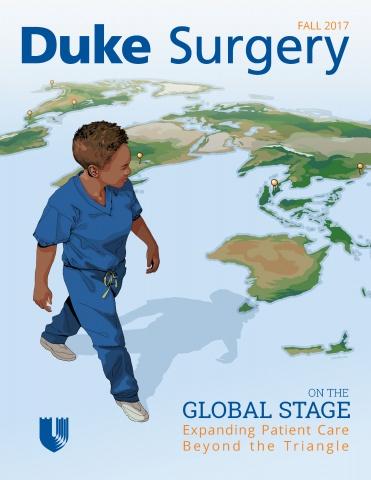
Access to safe, affordable surgical care still remains a privilege, one enjoyed by only a minority. According to a 2016 report by the Lancet Commission on Global Surgery, 2 out of every 3 people in the world lack access to surgical care.
To bridge this gap, Duke Surgery has extended its reach beyond the City of Medicine and onto the global stage, with several initiatives combining research, training, and collaboration to establish sustainable healthcare in areas of need.
Improving Outcomes for Traumatic Brain Injury Patients in Tanzania
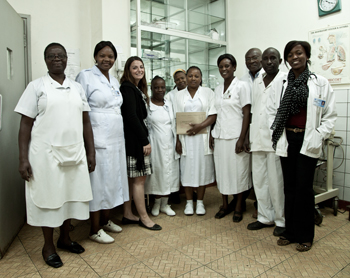
When Catherine Staton, MD, first arrived in Moshi, Tanzania, her goal was to improve outcomes for traumatic brain injury patients at the Kilimanjaro Christian Medical Centre (KCMC), a regional referral hospital. As part of the Division of Emergency Medicine, Dr. Staton was impelled to improve quality of care for patients and identify the root causes of injury.
It became clear that the causes were twofold: a high incidence of traffic injuries and rampant alcohol use. The often lethal combination has created an epidemic in a country with an already struggling medical system.
“Currently, 1 out of every 3 injury patients that present to the KCMC Emergency Department for care has at-risk alcohol use,” says Dr. Staton. “There is no infrastructure to curb the harm that can come from alcohol. It creates a serious public health risk, and the hospitals are overwhelmed with traumas.”
For six months of the year, Dr. Staton moves with her family to Tanzania, where she continues her research at KCMC and is developing an alcohol intervention for patients. Through focus groups and surveys, Dr. Staton uncovered several of the cultural factors that lead to rampant and risky alcohol use, including access to alcohol at a young age, consuming alcohol for nutrition, and a lack of regulation around alcohol sales, use, or drunk driving.
The feasibility trial beginning in the spring of 2018 will screen all Emergency Department patients and conduct an intervention similar to the brief interventions performed with trauma patients in the United States. These discussions will educate patients on accepted standards for alcohol use and known complications from abuse.
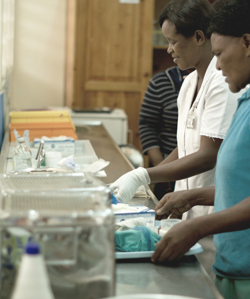
Through its partnership with Duke, KCMC has seen many positive changes, including the growth of the medical school and the addition of trained physicians. In Tanzania, residents must pay for their residency, so Duke Emergency Medicine currently sponsors two residents to become the second and third trained Emergency Medicine physicians at KCMC.
“It has been absolutely incredible to see,” says Dr. Staton. “The Duke Division of Emergency Medicine has given money to sponsor the residents, but our faculty members have also donated their own overtime hours to support them directly.”
This support makes a tremendous difference to a medical center with limited trained personnel. The ongoing program is still collecting clinical hour donations, 100% of which will be donated to sponsoring Tanzanian Emergency Medicine residents.
Improving Pediatric Care in Guatemala and Uganda
In Guatemala, 9,000 miles from Tanzania, Chief of Pediatric General Surgery Henry Rice, MD, uses similar methods to improve pediatric care.
Duke’s relationship with its partners in Guatemala has evolved from merely providing services in 2010 to a much broader initiative named the Safety and Quality Fellowship. In early 2016, Dr. Rice visited Guatemala to create a baseline assessment of health practices, and to meet with potential fellows who would take part in the training initiative.
“Our goal is to help Guatemalan physicians and hospital administrators develop their own capacity to enhance their pediatric surgical care,” says Dr. Rice. “This involves educational programs that provide clinical-based experience and training for physicians that they would have no access to otherwise.”
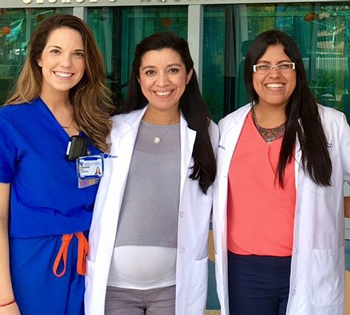
Coordinator Bria Johnston with Carla Ramírez, MD, and Sindy Mendez Soveranis, MD, of Roosevelt Hospital, Guatemala, during their visit to Duke
In September 2017, Duke welcomed its first two fellows to the program, Sindy Mendez Soveranis, MD, and Carla Ramírez, MD, from Roosevelt Hospital in Guatemala City. Duke Clinical Research Coordinator Bria Johnston was instrumental in organizing the two-week fellowship program held at Duke.
“This is a pretty ambitious program that allows the participants to go back to their local environments in a contextualized setting, and develop locally driven quality and safety initiatives, and then learn how to assess these over time,” says Dr. Rice.
The complete training curriculum would not have been successful without the generosity of Duke Surgery faculty, who met with the fellows to model the transition from safety and quality theory to actual practice, and discuss specific problem-solving strategies for issues at Roosevelt Hospital.
The Safety and Quality Fellowship could be replicated in other areas outside of Guatemala. Dr. Rice works closely with pediatric surgeon Tamara Fitzgerald, MD, PhD, who implements similar strategies to train pediatric surgeons in Uganda and sub-Saharan Africa, areas that have especially low surgeon-to-child ratios. In 2013, there was only one pediatric surgeon for 39 million people.
“My work focuses on empowering and increasing the numbers of pediatric surgical providers,” says Dr. Fitzgerald. “My Ugandan colleagues understand the problems, limitations, and available resources, and I can provide them my surgical experience, encouragement, and advocacy.”
Though Dr. Rice says fundraising is nine-tenths of the challenge, his goal is for Duke to continue to be a support system in these areas and others where resources are often limited.
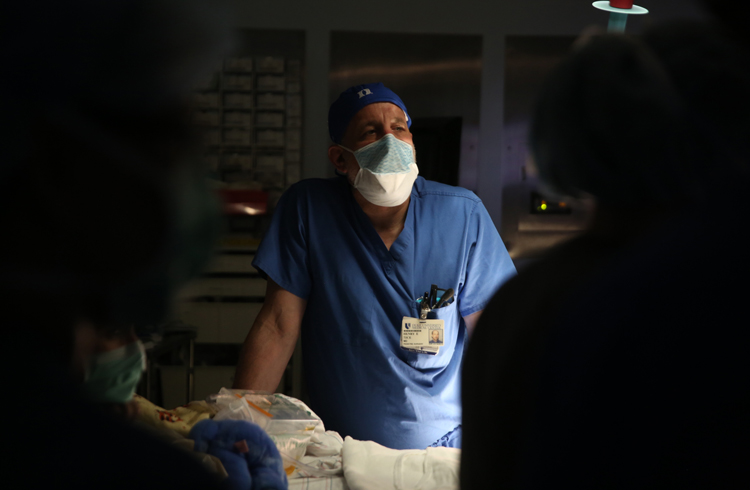
Screening for Hearing Loss in Alaska
Duke physicians do not need to leave American soil to find communities with unique healthcare challenges. Susan Emmett, MD, MPH, Division of Head and Neck Surgery & Communication Sciences, works in rural Alaska to reduce hearing loss, a major health disparity in the Alaska Native population.
Dr. Emmett’s commitment to global health began in Tanzania, where she completed a year-long Howard Hughes Medical Institute Research Training Fellowship as a Duke medical student. After returning to Duke as faculty, she now partners with remote communities in Alaska that face some similar challenges as patients in Tanzania.
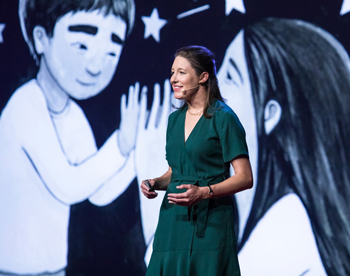
To address the tremendous burden of hearing loss in Arctic and sub-Arctic regions, Dr. Emmett is collaborating with a tribal health organization called the Norton Sound Health Corporation to develop a new paradigm to identify children with hearing loss and connect them to care.
“Untreated hearing loss has a lifelong impact,” explains Dr. Emmett. “In early childhood, hearing loss can cause speech and language delays. In school-aged children,
even mild hearing loss is linked to lower performance and higher dropout rates, and adults with hearing loss are more likely to be low-income or unemployed.”
Screening often and early is the key to effective prevention and care, but current hearing tests require specialized equipment and a trained audiologist, luxuries few remote Alaska communities have. Though school-based hearing screenings are already required by the state of Alaska, protocols vary and children are often lost to follow-up.
Dr. Emmett’s work, however, will combine two technologies that she considers to be game-changing.
“The randomized trial will test a new method of completing school hearing screening and referral,” she says. “We will use the first clinically validated cell phone–based screen, a technology developed in South Africa. Part of its power is that the technology does not require an audiologist to complete the screening, so it could extend screening capabilities to remote areas.”
The unique nature of healthcare in Alaska led to the second innovation of Dr. Emmett’s study. To address the barrier of distance in a state where 75% of communities are not connected to a hospital by road, Alaska has developed one of the most advanced telemedicine systems in the world. With such an innovative and sophisticated system already in place, Dr. Emmett and her partners at Norton Sound are utilizing the existing telemedicine network for school hearing screening referrals rather than establishing new infrastructure.
Similar to the cell-based hearing screen, telemedicine technology has become cell-based as well, making it a viable option for care in remote communities across the world. The model of mobile telemedicine in Alaska could have the potential for global impact on hearing loss disparities, and Dr. Emmett hopes that the current study will shed light on this process.
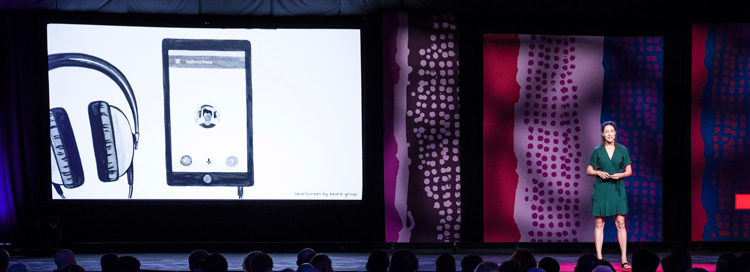
Commitment and Communication: Catalysts for Change
Global change does not happen overnight. Back in Durham, after two weeks in the Safety and Quality training, Drs. Soveranis and Ramírez prepared to return to their hospital in Guatemala, taking with them valuable tools that they feel will be a cornerstone of change.
The challenges at her hospital are difficult ones to solve, says Dr. Ramírez, but she is confident that effective communication among the staff and a commitment to progress will continue to make a difference.
“Working with Duke has showed us that we have to start small in making changes,” says Dr. Ramirez. “We can then continue to build, and by improving our communication and using tools that we have been given, we can improve the environment for both our staff and our patients.”
These small changes—in Guatemala, Tanzania, Uganda, Alaska, Durham, and elsewhere—can combine to enact change on a global scale.